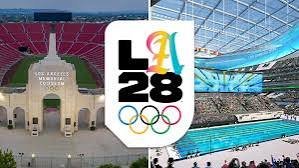
1. Introduction: A Return to the City of Angels
The 2028 Summer Olympics, officially known as the Games of the XXXIV Olympiad, are scheduled to take place from July 14 to July 30, 2028, in Los Angeles, California, United States. Known colloquially as LA28, this edition marks the third time Los Angeles has hosted the Summer Games — previously in 1932 and 1984.
In this article, we’ll explore everything you need to know—from the host city’s background and selection process, to key venues, planning strategies, and innovations that make these Games unique.
2. Who Will Host the 2028 Olympics — and How Was It Decided?
In a departure from tradition, the International Olympic Committee (IOC) simultaneously awarded the 2024 Summer Olympics to Paris and the 2028 Summer Olympics to Los Angeles during the 131st IOC Session in Lima, Peru, on September 13, 2017.
Los Angeles was selected as the 2028 host after three other candidate cities withdrew from the 2024 race. In recognition of LA’s readiness and existing infrastructure, the IOC made a dual awarding, giving Paris 2024 and LA 2028—an unprecedented move.
3. Where Will the Games Be Held? Exploring the Venues
Unlike many Olympic hosts, LA is employing a “no-build” strategy, utilizing existing or already-under-construction venues rather than erecting new stadiums. Here’s a breakdown of major clusters and venues:
a. Downtown Sports Park / Central LA:
-
Los Angeles Memorial Coliseum: Athletic competitions and dual role in opening/closing ceremonies (historic — previously used in 1932, 1984).
-
Crypto.com Arena (L.A. Live): Gymnastics and basketball.
-
LA Convention Center: Martial arts, weightlifting, table tennis.
b. Inglewood & South Bay Cluster:
-
SoFi Stadium: Opening and closing ceremonies (opening at SoFi, closing at Coliseum), swimming—becoming the largest swimming venue in Olympic history.
-
Intuit Dome (new): Basketball.
-
Dignity Health Sports Park: Tennis, cycling, rugby.
c. Westside & Coastal Venues:
-
UCLA Campus: Olympic Village for athletes.
-
Santa Monica, Venice Beach: Sailing, beach volleyball, triathlon finish lines.
d. Greater LA Area & Other Sites:
-
Long Beach Sports Park: Aquatics, triathlon, BMX; served by nearby Metro stations.
-
Rose Bowl: Football finals (soccer)
-
Riviera Country Club: Golf Wikipedia.
-
Universal Studios Lot: Squash (first time ever at the Olympics), 32 competitors.
e. Out-of-State Venues – Oklahoma City:
-
Oklahoma City will host softball and canoe slalom events due to LA’s lack of suitable venues.
4. Why LA Is an Ideal Host for 2028
Los Angeles benefits from top-tier infrastructure, robust transit upgrades, and a globally recognizable brand:
-
Existing Facilities: No need for expensive “white elephant” structures; sustainability and cost-efficiency are prioritized.
-
Transit Enhancements: Expanding subway lines, bus networks, and an Inglewood People Mover aim to support a “car-free” Olympics—a strategic campaign endorsed by Mayor Karen Bass.
-
Cultural Prowess: As the entertainment capital, LA brings experience in staging mega-events, storytelling, and production quality.
-
Legacy Programs: The PlayLA youth sports initiative has enrolled over one million children in over 40 sports, emphasizing long-term community impact.
5. Schedule Highlights — When and Where
-
Opening Ceremony: July 14, 2028 — split between SoFi Stadium and LA Memorial Coliseum.
-
Closing Ceremony: July 30, 2028 — Los Angeles Memorial Coliseum.
-
Triathlon: Begins at Venice Beach, marathon ends the athletics schedule.
-
The Games will span 800 events across 40+ sports, with 15,000 athletes participating.
-
Athletics in week one; swimming shifted to week two — a novel scheduling twist.
6. New & Returning Sports — A Fresh Olympic Experience
LA28 introduces and reintroduces several sports:
Debuting or returning disciplines:
-
Flag football
-
Squash
-
Cricket
-
Lacrosse
-
Baseball/Softball
-
Obstacle-course racing (replacing modern pentathlon’s equestrian show jumping).
Other returning sports:
-
Surfing
-
Skateboarding (previously included)
-
Breakdancing will not return for 2028.
7. Paralympics 2028 — Greater Inclusion and Firsts
-
2028 Summer Paralympic Games: Scheduled August 15–27, 2028 in Los Angeles.
-
Opening Ceremony: SoFi Stadium; Closing Ceremony: Los Angeles Memorial Coliseum.
-
Athlete count: Approximately 4,400 across 560 events in 23 sports; includes paraclimbing’s debut.
8. Planning & Infrastructure Challenges
Despite the advantages, LA faces notable challenges:
-
Wildfire Recovery: Recent wildfires impacted the region, though Olympic venues remain intact. Prolonged infrastructure recovery may strain logistics and resources.
-
Transit Projects: Budget cuts have scaled back the Inglewood People Mover from $1B to $200M, creating uncertainty about completion before the Games.
9. Why It Matters — Legacy of LA28
Los Angeles’ 2028 Olympics underscore a shift in Olympic hosting philosophy—prioritizing sustainability, reuse, and economic prudence:
-
No new permanent builds.
-
Leveraging existing cultural and transit assets.
-
Community-driven programs (PlayLA).
-
Sports expansion reflecting global trends.
LA28 is poised to deliver a dynamic, cinematic, and universally accessible Olympic experience — blending athletic excellence with Hollywood spectacle.
10. Summary Table
| Topic | Key Details |
|---|---|
| Host City | Los Angeles, California, USA (chosen in 2017 IOC session) |
| Dates | Olympics: July 14–30, 2028; Paralympics: August 15–27, 2028 |
| Venues | Iconic sites: Coliseum, SoFi, Crypto.com Arena, UCLA, Long Beach, etc. |
| New Sports | Squash, flag football, cricket, lacrosse, baseball/softball, obstacle racing |
| Sustainability Approach | “No-build” model — reuse existing venues |
| Transport Strategy | Transit upgrades; push for “car-free” Games |
| Challenges | Wildfire recovery; uncertain transit extensions |
| Legacy Impact | Youth sports programs, inclusivity, cost-efficient hosting |
Final Thoughts
The 2028 Summer Olympics in Los Angeles promise more than just sport. They represent a forward-thinking approach to hosting, one that blends Hollywood showmanship with pragmatic, sustainable planning and community engagement. From debuting iconic new sports to revitalizing local transit and inspiring future athletes through PlayLA, LA28 is set to redefine what an Olympic Games can—and should—be.
